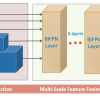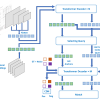Mobile ad hoc network (MANET) is an
autonomous self-configuring infrastructure-less wireless
network. MANET is vulnerable to a lot of routing security
threats due to unreliability of its nodes that are highly involved in
the routing process. In this paper, a new technique is proposed to
enhance the security of one of the most popular MANET routing
protocols that is called Ad hoc on Demand Distance Vector
(AODV) with minimum routing overhead and high packet
delivery ratio. The proposed technique intends to detect and
remove black, gray, and cooperative black hole AODV attacks
depending on a mobile backbone network constructed from
randomly moving regular MANET nodes based on their trust
value, location, and power. The backbone network monitors
regular nodes as well as each other to periodically estimate
monitoring trust values which represent the reliability of each
node in the network. The drop in the monitoring trust value of
any node is used as a clue to its malicious behavior. The
backbone network also tries to bait the malicious nodes to reply
to a request for a route to fake destination address. The proposed
technique uses the control packets of the AODV to exchange its
control information which highly reduces the overhead. The
simulation results show that the performance of the proposed
technique is more secure than AODV and the other recently
introduced techniques.
Research Department
Research Journal
International Journal of Advanced Computer Science and Applications (IJACSA)
Research Member
Research Rank
1
Research Publisher
The Science and Information Organization
Research Vol
Vol 6- No. 5
Research Website
http://thesai.org/Publications/ViewPaper?Volume=6&Issue=5&Code=ijacsa&SerialNo=11
Research Year
2015
Research_Pages
pp. 60-70
Research Abstract







